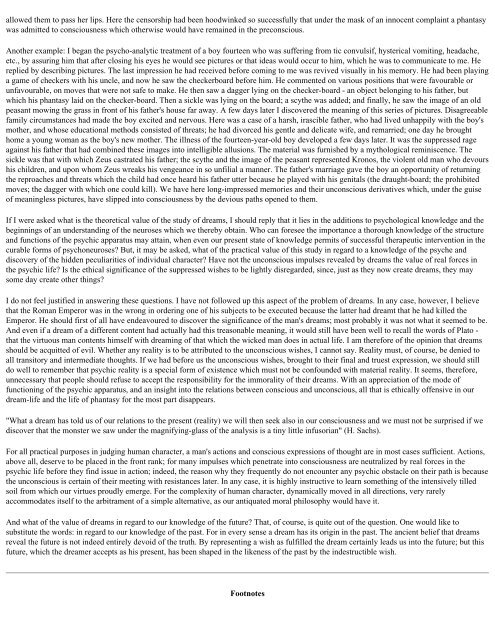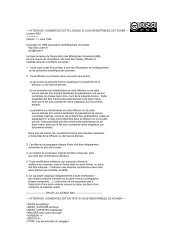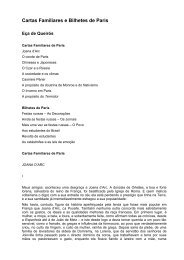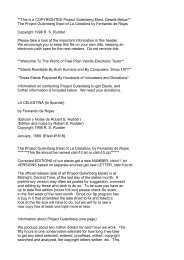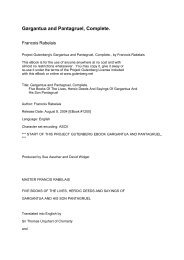The Interpretation of Dreams Sigmund Freud (1900)
The Interpretation of Dreams Sigmund Freud (1900)
The Interpretation of Dreams Sigmund Freud (1900)
Create successful ePaper yourself
Turn your PDF publications into a flip-book with our unique Google optimized e-Paper software.
allowed them to pass her lips. Here the censorship had been hoodwinked so successfully that under the mask <strong>of</strong> an innocent complaint a phantasy<br />
was admitted to consciousness which otherwise would have remained in the preconscious.<br />
Another example: I began the psycho-analytic treatment <strong>of</strong> a boy fourteen who was suffering from tic convulsif, hysterical vomiting, headache,<br />
etc., by assuring him that after closing his eyes he would see pictures or that ideas would occur to him, which he was to communicate to me. He<br />
replied by describing pictures. <strong>The</strong> last impression he had received before coming to me was revived visually in his memory. He had been playing<br />
a game <strong>of</strong> checkers with his uncle, and now he saw the checkerboard before him. He commented on various positions that were favourable or<br />
unfavourable, on moves that were not safe to make. He then saw a dagger lying on the checker-board - an object belonging to his father, but<br />
which his phantasy laid on the checker-board. <strong>The</strong>n a sickle was lying on the board; a scythe was added; and finally, he saw the image <strong>of</strong> an old<br />
peasant mowing the grass in front <strong>of</strong> his father's house far away. A few days later I discovered the meaning <strong>of</strong> this series <strong>of</strong> pictures. Disagreeable<br />
family circumstances had made the boy excited and nervous. Here was a case <strong>of</strong> a harsh, irascible father, who had lived unhappily with the boy's<br />
mother, and whose educational methods consisted <strong>of</strong> threats; he had divorced his gentle and delicate wife, and remarried; one day he brought<br />
home a young woman as the boy's new mother. <strong>The</strong> illness <strong>of</strong> the fourteen-year-old boy developed a few days later. It was the suppressed rage<br />
against his father that had combined these images into intelligible allusions. <strong>The</strong> material was furnished by a mythological reminiscence. <strong>The</strong><br />
sickle was that with which Zeus castrated his father; the scythe and the image <strong>of</strong> the peasant represented Kronos, the violent old man who devours<br />
his children, and upon whom Zeus wreaks his vengeance in so unfilial a manner. <strong>The</strong> father's marriage gave the boy an opportunity <strong>of</strong> returning<br />
the reproaches and threats which the child had once heard his father utter because he played with his genitals (the draught-board; the prohibited<br />
moves; the dagger with which one could kill). We have here long-impressed memories and their unconscious derivatives which, under the guise<br />
<strong>of</strong> meaningless pictures, have slipped into consciousness by the devious paths opened to them.<br />
If I were asked what is the theoretical value <strong>of</strong> the study <strong>of</strong> dreams, I should reply that it lies in the additions to psychological knowledge and the<br />
beginnings <strong>of</strong> an understanding <strong>of</strong> the neuroses which we thereby obtain. Who can foresee the importance a thorough knowledge <strong>of</strong> the structure<br />
and functions <strong>of</strong> the psychic apparatus may attain, when even our present state <strong>of</strong> knowledge permits <strong>of</strong> successful therapeutic intervention in the<br />
curable forms <strong>of</strong> psychoneuroses? But, it may be asked, what <strong>of</strong> the practical value <strong>of</strong> this study in regard to a knowledge <strong>of</strong> the psyche and<br />
discovery <strong>of</strong> the hidden peculiarities <strong>of</strong> individual character? Have not the unconscious impulses revealed by dreams the value <strong>of</strong> real forces in<br />
the psychic life? Is the ethical significance <strong>of</strong> the suppressed wishes to be lightly disregarded, since, just as they now create dreams, they may<br />
some day create other things?<br />
I do not feel justified in answering these questions. I have not followed up this aspect <strong>of</strong> the problem <strong>of</strong> dreams. In any case, however, I believe<br />
that the Roman Emperor was in the wrong in ordering one <strong>of</strong> his subjects to be executed because the latter had dreamt that he had killed the<br />
Emperor. He should first <strong>of</strong> all have endeavoured to discover the significance <strong>of</strong> the man's dreams; most probably it was not what it seemed to be.<br />
And even if a dream <strong>of</strong> a different content had actually had this treasonable meaning, it would still have been well to recall the words <strong>of</strong> Plato -<br />
that the virtuous man contents himself with dreaming <strong>of</strong> that which the wicked man does in actual life. I am therefore <strong>of</strong> the opinion that dreams<br />
should be acquitted <strong>of</strong> evil. Whether any reality is to be attributed to the unconscious wishes, I cannot say. Reality must, <strong>of</strong> course, be denied to<br />
all transitory and intermediate thoughts. If we had before us the unconscious wishes, brought to their final and truest expression, we should still<br />
do well to remember that psychic reality is a special form <strong>of</strong> existence which must not be confounded with material reality. It seems, therefore,<br />
unnecessary that people should refuse to accept the responsibility for the immorality <strong>of</strong> their dreams. With an appreciation <strong>of</strong> the mode <strong>of</strong><br />
functioning <strong>of</strong> the psychic apparatus, and an insight into the relations between conscious and unconscious, all that is ethically <strong>of</strong>fensive in our<br />
dream-life and the life <strong>of</strong> phantasy for the most part disappears.<br />
"What a dream has told us <strong>of</strong> our relations to the present (reality) we will then seek also in our consciousness and we must not be surprised if we<br />
discover that the monster we saw under the magnifying-glass <strong>of</strong> the analysis is a tiny little infusorian" (H. Sachs).<br />
For all practical purposes in judging human character, a man's actions and conscious expressions <strong>of</strong> thought are in most cases sufficient. Actions,<br />
above all, deserve to be placed in the front rank; for many impulses which penetrate into consciousness are neutralized by real forces in the<br />
psychic life before they find issue in action; indeed, the reason why they frequently do not encounter any psychic obstacle on their path is because<br />
the unconscious is certain <strong>of</strong> their meeting with resistances later. In any case, it is highly instructive to learn something <strong>of</strong> the intensively tilled<br />
soil from which our virtues proudly emerge. For the complexity <strong>of</strong> human character, dynamically moved in all directions, very rarely<br />
accommodates itself to the arbitrament <strong>of</strong> a simple alternative, as our antiquated moral philosophy would have it.<br />
And what <strong>of</strong> the value <strong>of</strong> dreams in regard to our knowledge <strong>of</strong> the future? That, <strong>of</strong> course, is quite out <strong>of</strong> the question. One would like to<br />
substitute the words: in regard to our knowledge <strong>of</strong> the past. For in every sense a dream has its origin in the past. <strong>The</strong> ancient belief that dreams<br />
reveal the future is not indeed entirely devoid <strong>of</strong> the truth. By representing a wish as fulfilled the dream certainly leads us into the future; but this<br />
future, which the dreamer accepts as his present, has been shaped in the likeness <strong>of</strong> the past by the indestructible wish.<br />
Footnotes


